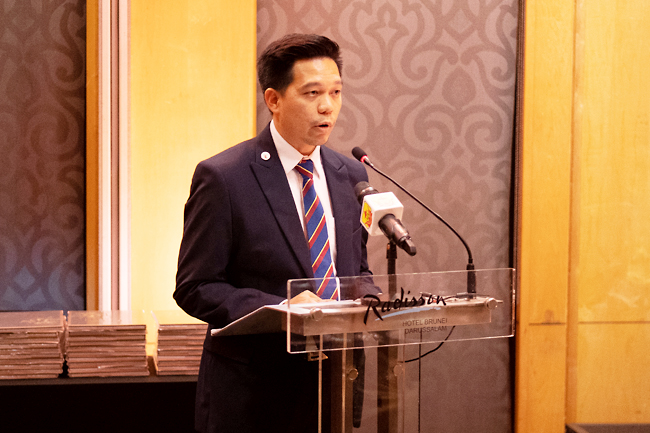The Cardiac Society Brunei Darussalam officially launched the Brunei Darussalam National Heart Failure Guidelines 2023 during the society’s 10th Annual Scientific Meet Gala Dinner last night at Radisson Hotel Brunei, a significant milestone in the field of cardiovascular healthcare in Brunei Darussalam.
The guideline aims to address health concerns with emphasis on identifying and treating risk factors for developing Heart Failure (HF), and early and prompt diagnosis and treatment of HF based on the latest evidence and international guidelines.
Minister of Health Dato Seri Setia Dr Haji Mohd Isham bin Haji Jaafar was the guest of honour.
The society has been diligently working to develop a comprehensive guideline to address the management and treatment of HF. The guidelines are a culmination of collaboration among experts in the field and a commitment to improve the quality of cardiac care for the people of Brunei, said President of the Cardiac Society Brunei Darussalam Dr Nadzir Juanda.
“I am confident that these guidelines will serve as an important tool for all healthcare professionals involved in the management of HF patients to help recognise early and advanced HF signs and symptoms and guide physicians on the various treatment modalities based on the latest data and research,” said the minister.

“I would like to express my gratitude to the healthcare professionals and organisations involved in the development of this guideline. Your dedication to improving the health of our nation is commendable, and your contributions are invaluable,” he added.
HF represents a global public health challenge. Studies have shown that there are over 26 million cases of HF worldwide, with six million new cases diagnosed each year, with an expected increase in number of patients by 2030 by 50 per cent.
Reasons for this include the ageing population, better treatment and survival from other heart diseases such as heart attacks, and increasing prevalence of non-communicable diseases such as hypertension and diabetes.
HF is the leading cause of hospitalisations in people over the age of 65. The risk of death from HF is high – approximately 50 per cent of patients will die within five years after diagnosis. HF imposes a significant economic burden on the healthcare system – approximately two per cent of the healthcare budget is spent on treatment of HF.
Patients with HF in Asia are younger – with an average age of 60 compared to 70 in Europe and 75 in the United States. The society’s own studies showed the average age of HF patients in Brunei is a decade younger, those in the 50s.
One in three patients has a history of diabetes, hypertension and high cholesterol.
These non-communicable diseases are known risk factors for the development of risk factors on its own.
Almost 40 per cent of cardiology admissions are due to HF or known to have HF with 10 per cent of patients having multiple re-admissions 12 months after discharge.
A proportion of patients will continue to deteriorate despite the best medical care and they will require advanced treatment, including mechanical circulatory support. Experts at Gleneagles JPMC provide these advanced therapies in close collaboration with the cardiology team from the Ministry of Health. Unfortunately, despite these treatments, some patients will need palliative care support due to the severity of HF or if unsuitable for advanced HF therapies.
Care of HF patients requires a multidisciplinary team effort and HF nurse specialists, cardiac rehabilitation and dietitian input are paramount.
The guideline is expected to enhance the quality of care for patients with HF, reduce hospital admissions, and ultimately improve the overall cardiovascular health of the population.
The event also saw the presentation of the Brunei Darussalam National Heart Failure Guidelines 2023 to representatives from hospitals and other healthcare institutions. – Adib Noor



















































